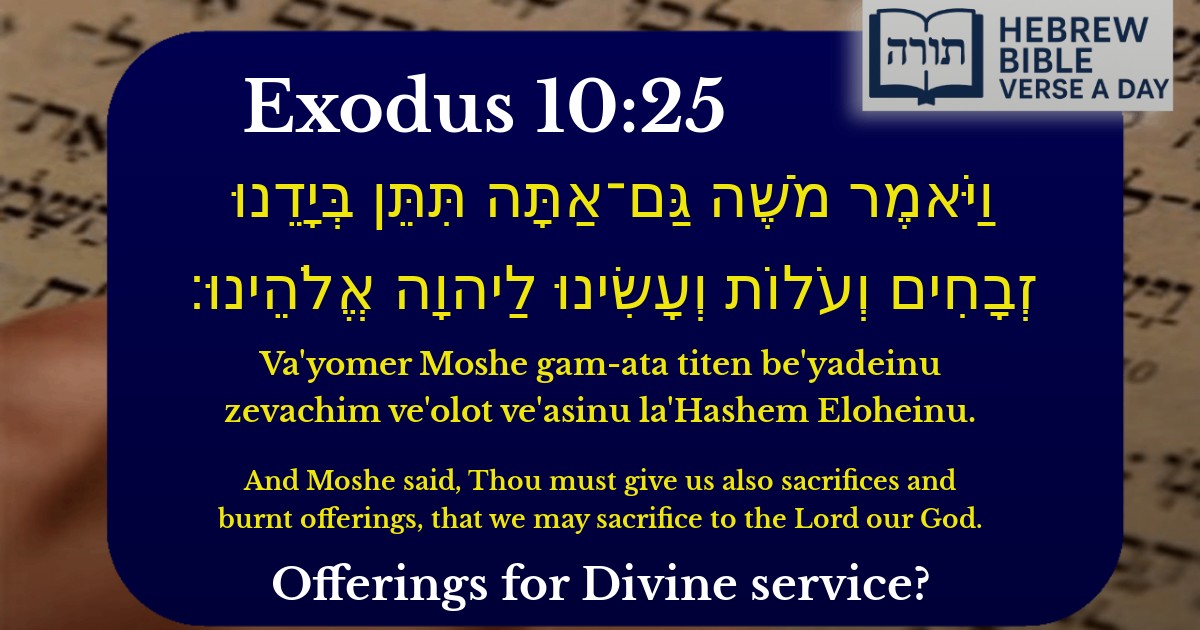Join Our Newsletter To Be Informed When New Videos Are Posted
Join the thousands of fellow Studends who rely on our videos to learn how to read the bible in Hebrew for free!
Hebrew Text
וַיֹּאמֶר מֹשֶׁה גַּם־אַתָּה תִּתֵּן בְּיָדֵנוּ זְבָחִים וְעֹלוֹת וְעָשִׂינוּ לַיהוָה אֱלֹהֵינוּ׃
English Translation
And Moshe said, Thou must give us also sacrifices and burnt offerings, that we may sacrifice to the Lord our God.
Transliteration
Va'yomer Moshe gam-ata titen be'yadeinu zevachim ve'olot ve'asinu la'Hashem Eloheinu.
Hebrew Leining Text
וַיֹּ֣אמֶר מֹשֶׁ֔ה גַּם־אַתָּ֛ה תִּתֵּ֥ן בְּיָדֵ֖נוּ זְבָחִ֣ים וְעֹלֹ֑ת וְעָשִׂ֖ינוּ לַיהֹוָ֥ה אֱלֹהֵֽינוּ׃
וַיֹּ֣אמֶר מֹשֶׁ֔ה גַּם־אַתָּ֛ה תִּתֵּ֥ן בְּיָדֵ֖נוּ זְבָחִ֣ים וְעֹלֹ֑ת וְעָשִׂ֖ינוּ לַיהֹוָ֥ה אֱלֹהֵֽינוּ׃
🎵 Listen to leining
Parasha Commentary
📚 Talmud Citations
This verse is not quoted in the Talmud.


Context of the Verse
This verse (Exodus 10:25) appears during the negotiations between Moshe and Pharaoh before the final plague, the death of the firstborn. Moshe insists that the Israelites must take their livestock to offer sacrifices to Hashem in the wilderness. Pharaoh initially resists, offering compromises, but Moshe remains firm in his demand.
Rashi's Explanation
Rashi (Exodus 10:25) explains that Moshe's demand for sacrifices was not merely for sustenance but for divine service. He emphasizes that the phrase "זְבָחִים וְעֹלוֹת" (sacrifices and burnt offerings) refers to the korbanot (sacrificial offerings) they would bring to Hashem. Rashi notes that Pharaoh had previously suggested leaving the livestock behind (Exodus 10:24), but Moshe countered that they needed the animals for both communal and individual offerings.
Rambam's Perspective
Rambam (Hilchot Melachim 8:11) discusses the broader principle that a nation must allow others to serve Hashem without interference. Moshe's insistence reflects the Jewish people's inherent right to worship through korbanot, a central mitzvah tied to their covenant with Hashem. Pharaoh's reluctance symbolizes the resistance of oppressive regimes to spiritual freedom.
Midrashic Insights
Theological Significance
This verse underscores the centrality of korbanot in Jewish worship, even in the face of opposition. Moshe's unwavering stance teaches that serving Hashem requires complete commitment, without compromise. The demand for sacrifices also foreshadows the eventual establishment of the Mishkan and Beit HaMikdash, where such offerings would become a permanent fixture of Jewish life.